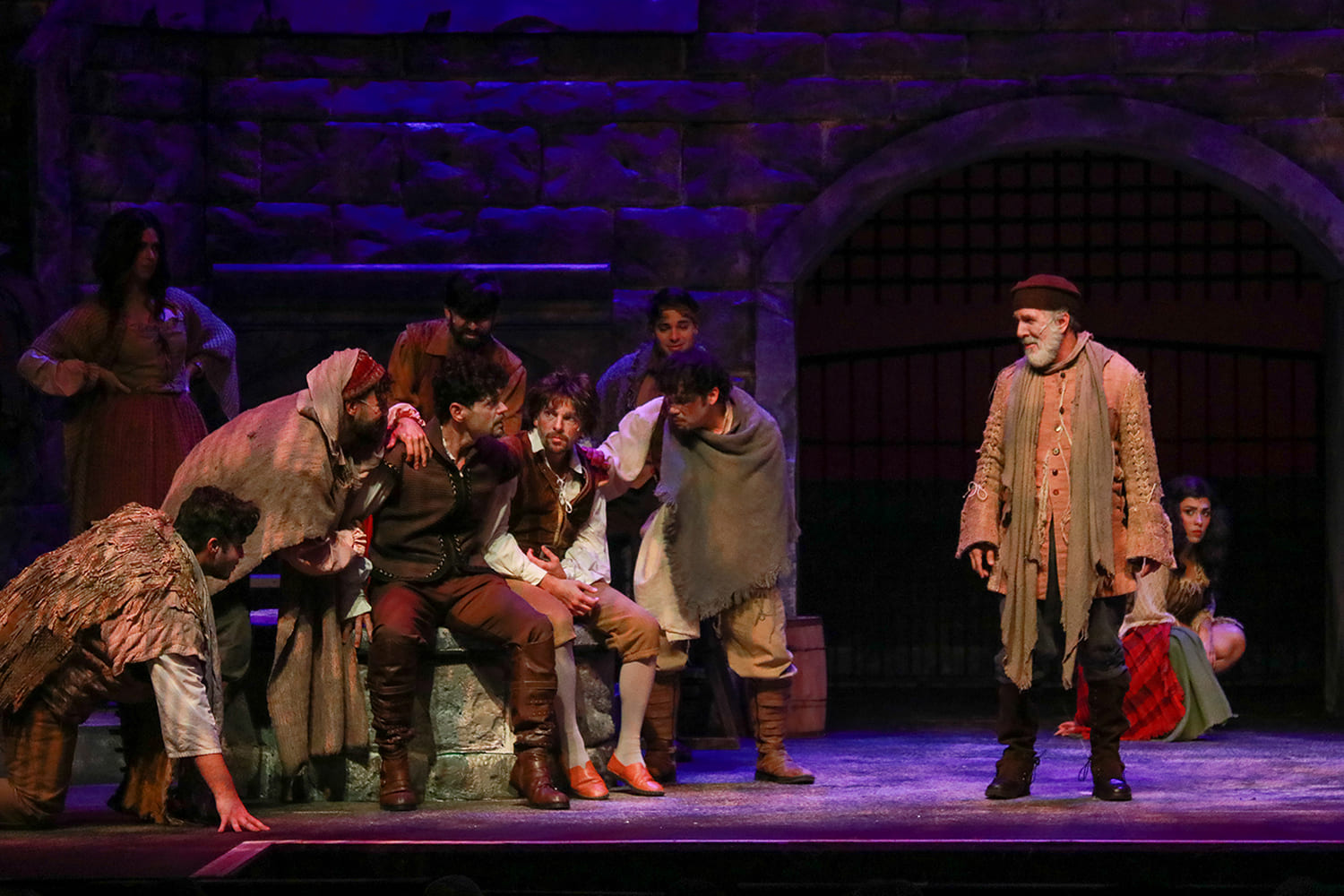
The cast of "Man of La Mancha." (Photo by Alberto Romeu)
The seemingly impossible dream feels achievable when you peer into E.L. Losada's wide, shining eyes, aglow with sincere optimism and belief. When you hear the convincing conviction, determination, and optimism in his robust, crystalline voice, you sense that elusive dream shifting a little closer to reality.
Losada, whose professional acting career began as an ensemble member in Actors' Playhouse's production of "The King and I" in 2002, is now achieving what likely once felt out of reach. He's the one leading the charge this time, delivering an inspiring performance in the company's invigorating new production of "Man of La Mancha," which runs more than two hours, including an intermission.
Interestingly, as the idealistic Don Quixote, Losada sometimes claps twice - and the lighting immediately shifts. If only perfecting the world were as easy as snapping your fingers or clapping your hands. But "Man of La Mancha," running through Sunday, Dec. 21 at the Miracle Theatre in Coral Gables, never pretends it's that simple. Instead, the musical, hardly a stranger to Actors' Playhouse audiences, urges us to keep doing our part to make a difference.
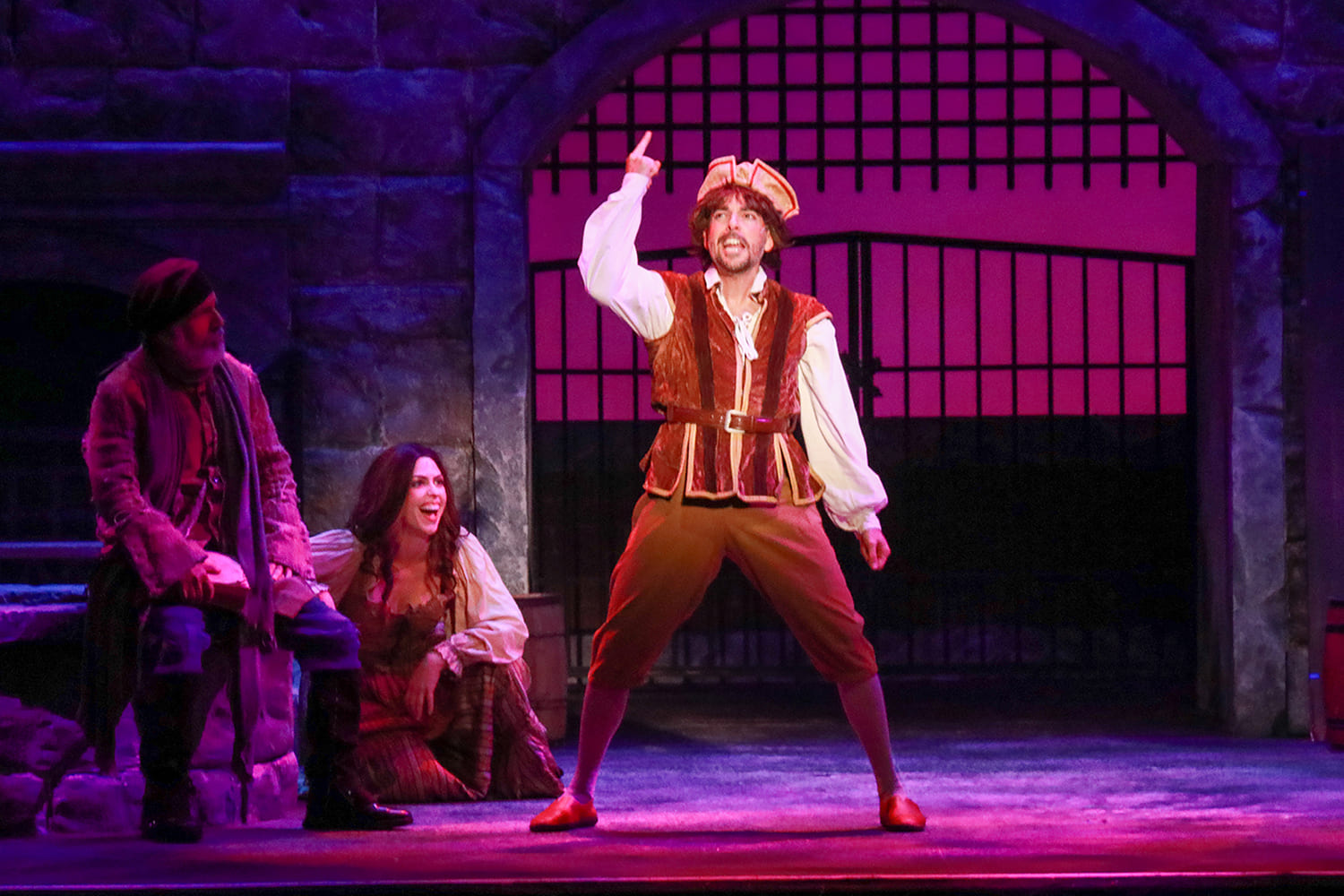
Paul Louis-Gonzalez, Carolina Ordonez, and Jose Luaces in Actors' Playhouse's production of "Man of La Mancha" through Sunday, Dec. 21 at the Miracle Mile Theatre in Coral Gables. (Photo by Alberto Romeu)
A Historic Milestone
Actors' Playhouse began making a difference in South Florida theatergoers' lives in February 1988, when the professional, nonprofit company staged its first production at its then–Kendall strip mall location. Its debut show? "Man of La Mancha." Fast forward to November 1995. Actors' Playhouse had just begun operations at its new home: the historic Miracle Theatre. And the inaugural production there? Again, "Man of La Mancha." Now, 30 years later, the company is celebrating its Miracle Theatre milestone by once again staging the old chestnut. The performers may have changed each time, but the award-winning company's commitment to delivering a superior product has remained constant.
Under Artistic Director David Arisco's astute guidance, Losada leads a powerhouse cast of triple threats. Most of the performers are Hispanic, a casting choice Arisco emphasized for authenticity (associate director/choreographer: Henry Gainza). After all, "Man of La Mancha" takes place in 1597 in Spain during the Spanish Inquisition. More specifically, the show opens in a prison in Seville, where author Miguel de Cervantes is awaiting trial for an alleged offense against the Catholic Church.
Shortly after he arrives at the prison with an unfinished manuscript, the artist's fellow prisoners “try” him for being an idealist and a bad poet. They also threaten to confiscate his manuscript. However, as a defense, Cervantes acts out Don Quixote's tale, casting the others in various parts. This inventive play-within-a-play format is among the qualities that have endeared many to this classic musical. It also features memorable, theme-enhancing songs by Mitch Leigh (with clever, sometimes humorous lyrics by Joe Darion) and a lively, funny, and ultimately moving book by Dale Wasserman. The tale focuses on themes that never become stale: the conflict between idealism and reality, the power of art, imagination, and storytelling, and the resilience of the human spirit. As a concept musical, "Man of La Mancha" emphasizes its overarching metaphor-the pursuit of noble ideals-over a strictly linear plot.
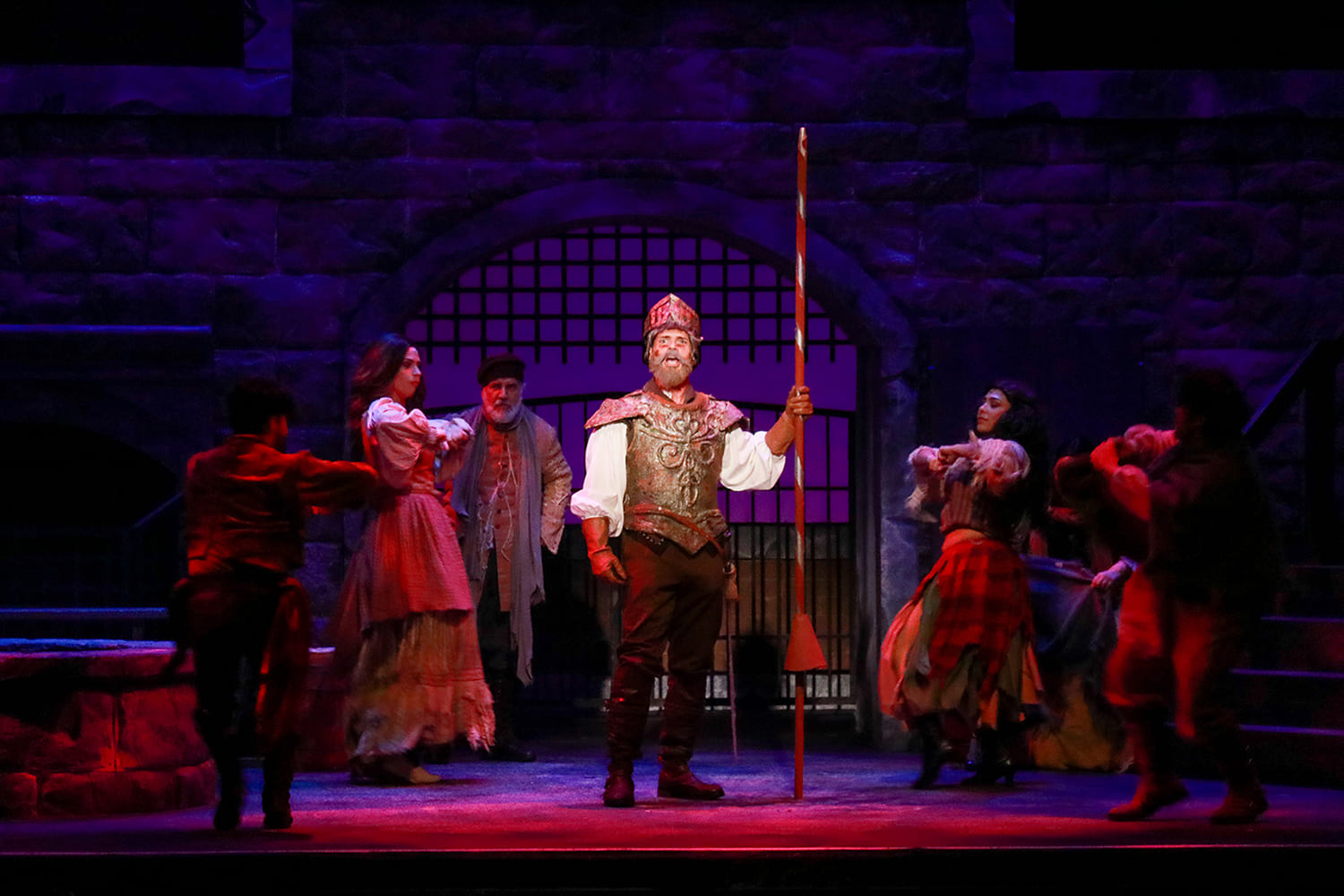
E.L. Losada as Don Quixote, center, with the cast of Actors' Playhouse's production of "Man of La Mancha" through Sunday, Dec. 21 at the Miracle Mile Theatre in Coral Gables. (Photo by Alberto Romeu)
Idealism Versus Realism
The musical explores how people can create meaning and inspire others by pursuing noble ideals, even during dark times such as the Spanish Inquisition. Of course, we're living in pretty dark times as well in 2025, so the show feels especially relevant today.
Certainly, it's tempting to want to identify a modern Don Quixote within our midst to ponder how much brighter life could become with a change in thinking and action plans. But we also need realists to identify where problems exist (realism and idealism can coexist in a healthy society). In "Man of La Mancha," the two are in conflict. The romantic and naïve Don Quixote (Alonso Quijano) clashes with the brutally realistic prostitute and peasant woman, Aldonza. Quijano's family and others also try to reason with him, as he believes he's a knight-errant tasked with reviving chivalry - a medieval code of conduct emphasizing courage, honor, and loyalty - righting wrongs, and defending the helpless.
The Battle Between Aldonza and Quixote
One of the recurring battles in "Man of La Mancha" is between Aldonza and Quijano/Quixote. He refuses to see her as a common, unrefined prostitute named Aldonza. Instead, he insists that she is his “lady,” he must forever serve her, and her real name is the more pleasant-sounding Dulcinea (a Spanish term meaning sweetheart or mistress). In fact, the aging man sings a song titled “Dulcinea.” Listen to the way he repeats the name - it practically sounds like a tender plea. The melody is elegant and gentle, befitting the aging man's personality.
By contrast, when she's had enough of him, disgust drips from her voice as she forcefully sings the severe-sounding song, “Aldonza.” Composed with minor notes and chords, it provides background (she was “spawned in a ditch by a mother who left me there, naked and cold and too hungry to cry”) and establishes her true identity. Aldonza continues singing, not mincing words: “I never blamed her, I'm sure she left hoping that I'd have the good sense to die!”
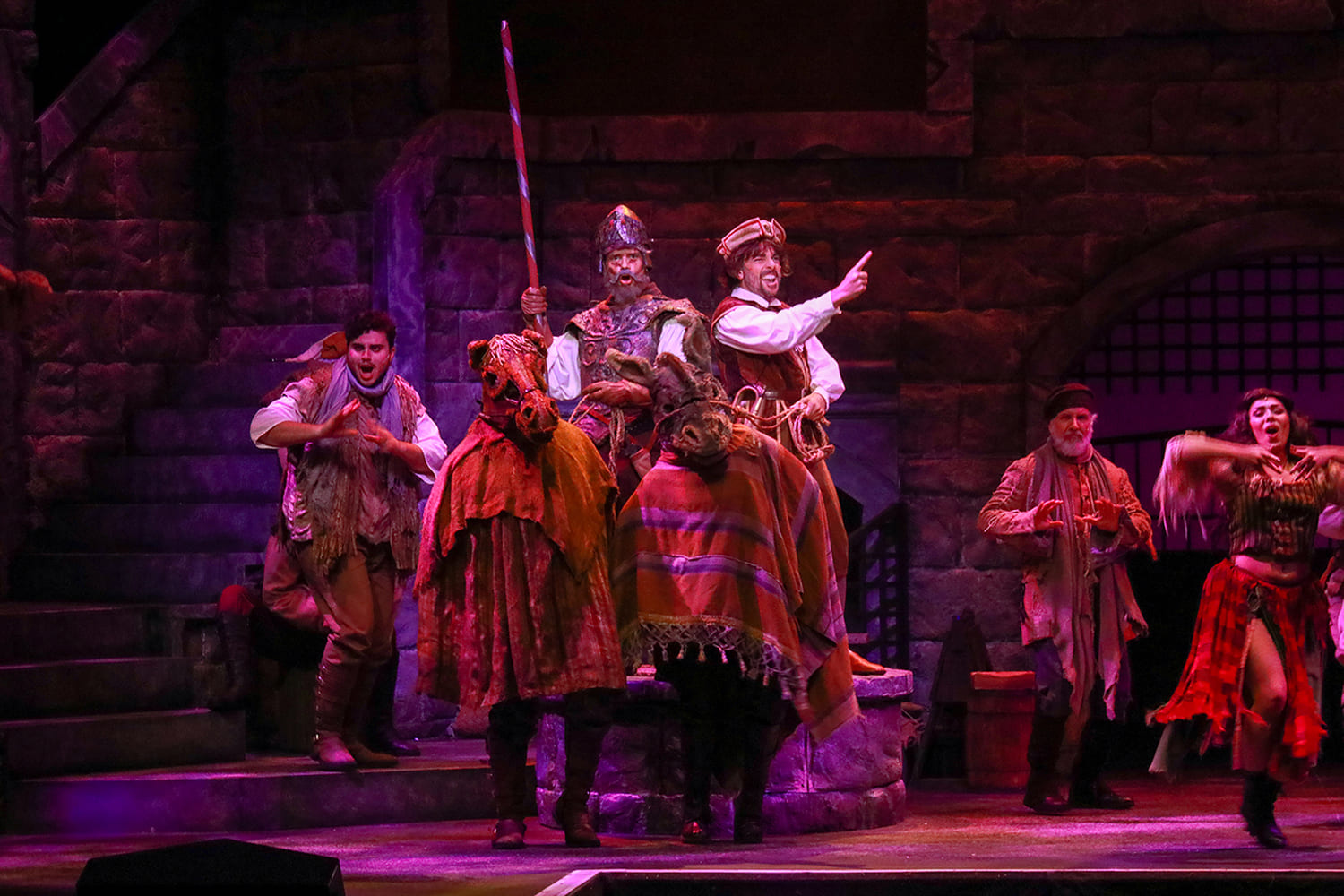
The cast. (Photo by Alberto Romeu Photography)
Award-winning South Florida performer Gaby Tortoledo, who deftly portrays Aldonza, has a soaring soprano-like voice that can sound sweet.
However, her pitch lowers and sounds coarse as she oozes believable bitterness, intensely yet naturally countering Quijano/Quixote. Her facial expressions display irritation, and she performs actions that reinforce her character's lowliness. At least once, she spits, and during another scene, she wipes what resembles a napkin under her armpits before handing it to someone else, even pretending to wipe it in her buttocks. The muleteers who taunt and physically abuse Aldonza also sound crude when they mock Quijano/Quixote's genteel manner of calling his “lady” Dulcinea. When these men sing “Little Bird, Little Bird,” the song sounds deceptively sweet and innocent, but darkness lurks beneath the seemingly innocuous lyrics and melody.
In her well-rounded portrayal, Tortoledo proves she's a versatile performer as she seamlessly transitions to a more sensitive character by the show's end. By then, Quijano/Quixote has clearly made a difference in Aldonza's life. “My name is Dulcinea,” she says elegantly at the end, and the emotion in her voice sounds authentic and earned.
Losada's Quixote
As Quijano/Quixote, Losada deftly performs musical numbers that convey earnestness and resolve. One of the show's most famous songs is titled "The Impossible Dream (The Quest)." When Losada delivers his rendition, he isn't just showing off his vocal prowess; he's acting out the song's emotions, gesturing properly, and raising his pitch when necessary. The song begins quietly but builds to higher notes and more intense vocals as Quijano/Quixote describes his “quest,” “no matter how hopeless, no matter how far.” The song's rising notes symbolize the singer's honorable aspirations. The show's composer built the title song ("I, Don Quixote") similarly, starting soft and increasing in volume while calling for believably passionate delivery. To his credit, Losada nails the tone. In a scene that is hard to watch, Losada's Quijano/Quixote looks and sounds like a frail, broken old man during one of the show's harshest moments, briefly gaining strength before collapsing at the end.
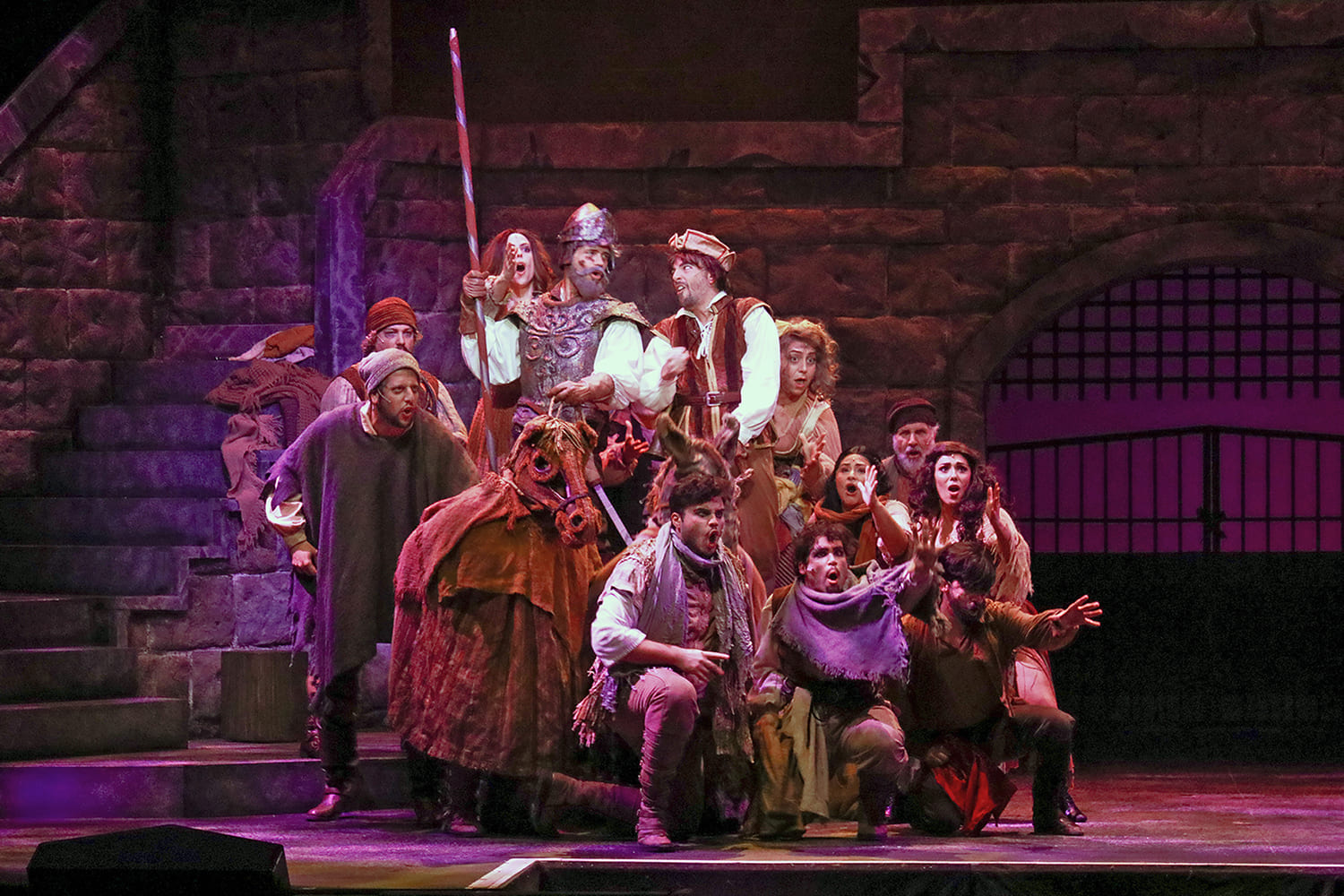
The cast of Actors' Playhouse's production of "Man of La Mancha" through Sunday, Dec. 21 at the Miracle Mile Theatre in Coral Gables. (Photo by Alberto Romeu).
Supporting Cast Highlights
Another actor who shines is Jose Luaces. His subservient and faithful squire, Sancho Panza, simply sings “I like him. I really like him” in a song with a bright melody, referring to his master, Quijano/Quixote, whom he will follow till the end. As Luaces portrays him, Panza is credibly loyal, nervous, and comical, offering comic relief in what is at times a dark show. Watching and listening may call to mind the bumbling LeFou in "Beauty and the Beast." Luaces dedicates his fine performance to his Coral Reef Senior High drama teacher, James Puig, who portrayed Panza on the Miracle's stage 30 years ago.
This production features a large cast of talented performers who each bring a distinct individuality to their roles. The actors ably act, dance, and sing, accompanied by a rich-sounding live band that never overpowers the singers (music director: Bruce Barnes). The choreography, executed with flair, is physical, befitting the harshness of some characters.
Staging and Design
This staging is more traditional than a 2019 version by MNM Theatre Company in West Palm Beach. In that particularly dark, almost immersive mounting, director Bruce Linser forced us to rethink preconceived notions and understand how the musical bears a frightening resemblance to modern times. Unlike the current version, MNM's production began without an overture or pre-curtain speech, with actors already in character. The purpose was clear: Audience members may be prisoners of their own apathy and inaction in the face of evil in the world.
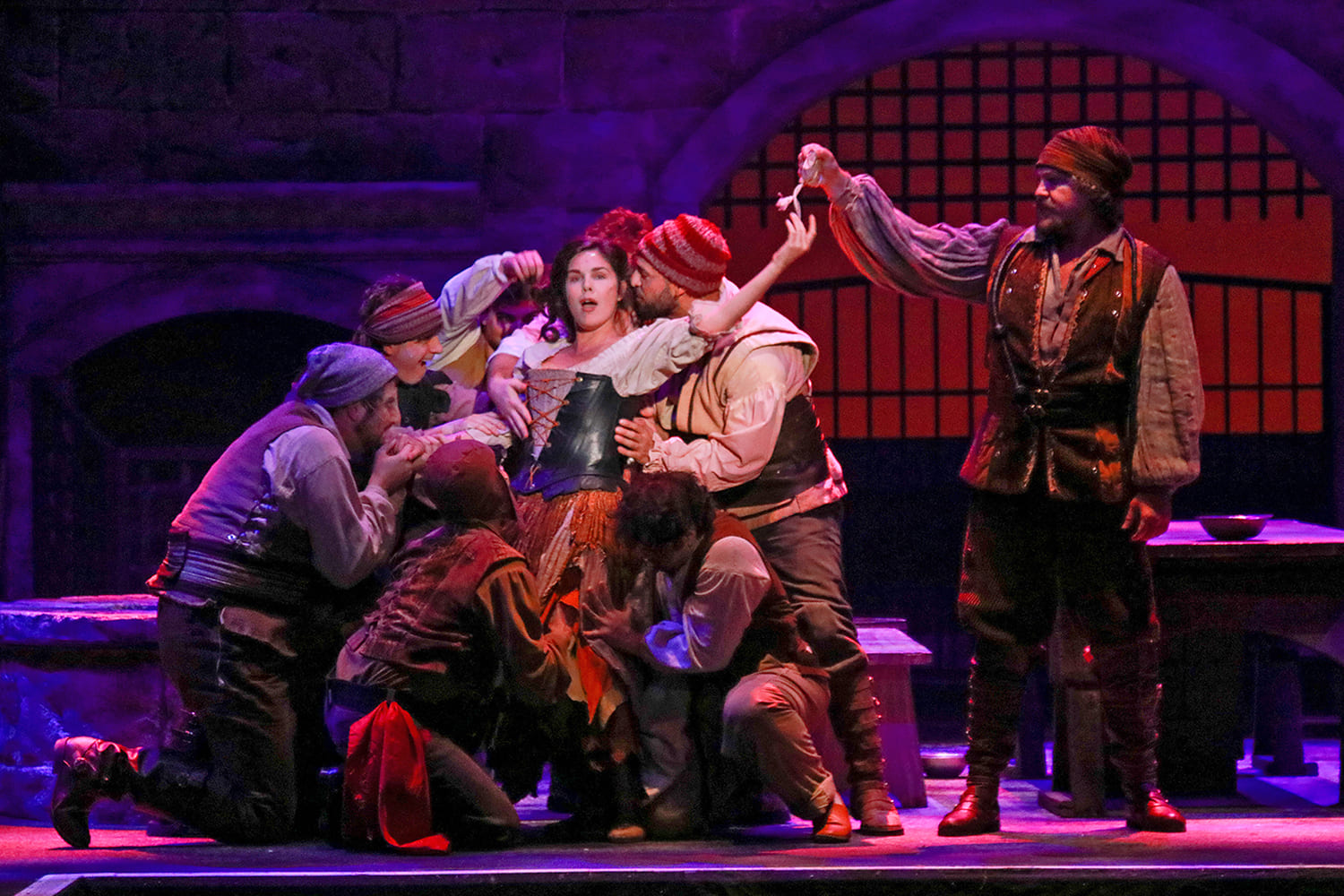
Gaby Tortoledo as Aldonza with the cast of "Man of La Mancha" through Sunday, Dec. 21 at Actors' Playhouse, Miracle Mile Theatre in Coral Gables. (Photo by Alberto Romeu). (Photo by Alberto Romeu Photography)
While Actors' version leans into the show's humor at times, it is dark when it needs to be. Scenic designer K. April Soroko's two-story prison includes colors such as black and grey. Minimalist yet effective, it establishes the story's tone. Similarly, Ellis Tillman's costumes include dark clothing, Eric Nelson's dim lighting sets mood, and sound designer Reidar Sorensen's effects sound appropriately discomfiting. Several scenes include believable physical struggles under Lee Soroko's solid fight direction.
Despite its darkness, by the end we realize that the “impossible dream” may not be impossible after all. The Jewish text Pirkei Avot (Ethics of the Fathers) states, “You are not obligated to complete the work (of improving the world), but neither are you free to abandon it.” Certainly, Quijano/Quixote - who ultimately makes Aldonza feel seen and valued - would agree.
IF YOU GO
WHAT: Actors' Playhouse current production of “Man of La Mancha.”
WHEN: Through Dec. 21. Evening performances are at 8 p.m. Wednesday through Saturday, with matinees at 3 p.m. on Sundays.
WHERE: The Miracle Theatre, 280 Miracle Mile in Coral Gables.
TICKETS: Ticket prices range from $40 to $100. Tickets can be purchased by calling (305) 444-9293, visiting www.actorsPlayhouse.org, or at the Actors' Playhouse Box Office (280 Miracle Mile, Coral Gables, FL 33134). 10 percent off all weekday performances for seniors and $15 student rush tickets 15 minutes prior to curtain with identification.
INFORMATION: (305) 444-9293 or www.actorsplayhouse.org.




